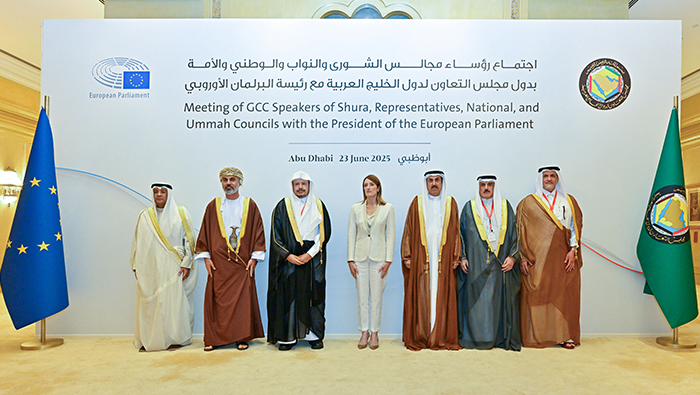
Muscat: The Shura Council on Monday participated in the Gulf-European Parliamentary Meeting held in Abu Dhabi, United Arab Emirates, with the participation of the heads of Shura, National, and Parliamentary Councils of the Gulf Cooperation Council (GCC) states, along with Roberta Metsola, President of the European Parliament.
The meeting forms part of ongoing efforts by both sides to activate channels of constructive dialogue and enhance cooperation on various shared concerns.
During the meeting, Khalid Hilal Al Maawali, Chairman of the Shura Council and head of the delegation, delivered an address in which he said: “The wise directives and forward-looking vision of the leaders of the GCC serve as a guiding compass for our legislative bodies in such forums. These gatherings aim to strengthen cohesion among our nations and institutions, deepen partnerships with regional and international counterparts, and work towards common goals. Inspired by this vision, we seek to enhance coordination, exchange experiences, and reinforce bilateral ties that contribute to economic and developmental integration, supporting a more prosperous and stable future for our countries.”
He commended the outcomes of the joint final communiqué of the first EU-GCC Leaders’ Summit, titled “Strategic Partnership for Peace and Prosperity,” and lauded the results of the GCC-European Parliamentary Committee meeting with the Delegation for Relations with the Arabian Peninsula in the European Parliament.
He emphasised the importance of this parliamentary channel in promoting ties between the EU and the GCC, particularly through enhanced cooperation in economic and development sectors to achieve sustainable growth.
He further highlighted the need to expand collaboration across areas such as climate change, regional security, and humanitarian assistance in crisis regions. He also called for an immediate ceasefire in Gaza, unimpeded humanitarian access, and serious efforts to end the Israeli-Palestinian conflict through the establishment of an independent and sovereign Palestinian state, in line with international resolutions and the Arab Peace Initiative—ensuring the right of peoples to live in freedom, dignity, and safety, with full respect for fundamental human rights.
Concluding his remarks, Al Maawali said: “We express our concern over the recent developments between the Islamic Republic of Iran and Israel, which threaten regional stability and undermine international efforts—particularly those led by the United States and Iran—to reach a peaceful agreement. We believe that the responsibility of parliaments and legislative councils extends beyond lawmaking and oversight; it includes defending humanitarian values and opposing aggressive policies that violate international law and the UN Charter. Therefore, we urge national, regional, and international parliaments to take clear and responsible stances that contribute to de-escalation, support peaceful solutions, and protect peoples’ rights to security, sovereignty, and stability.”
The joint meeting focused on key priority areas, including food and energy security, climate change, the shift to renewable and clean energy sources, the Fourth Industrial Revolution, digital transformation, and the role of advanced technologies in promoting sustainable development.
Participants praised the strength of the strategic partnership between the GCC and the European Union, founded on mutual respect, cooperation, and shared interests aimed at enhancing security, stability, development, and prosperity for both sides.
They stressed the importance of intensifying joint efforts to develop cooperative frameworks for addressing urgent challenges such as climate change, energy security, sustainable development, counterterrorism, and promoting universal human values of coexistence and tolerance.
On the sidelines of the meeting, the rapid and concerning developments in Gaza and the Middle East were addressed. Both sides stressed the need to protect civilians and civilian infrastructure, including healthcare institutions, in accordance with international law. They warned of the grave consequences of the current escalation and its impact on global peace and regional stability.
The participants called for an immediate halt to violations, protection of lives, and the secure and sustained delivery of humanitarian aid to Gaza.
They demanded a ceasefire in the territory and the release of hostages and detainees, affirming that a two-state solution remains the only viable path to a just and comprehensive peace.
The Gulf-European dialogue also touched on international efforts to end the war in Ukraine, reiterating commitment to resolving the conflict.
They welcomed the contributions of GCC countries in supporting ceasefire efforts, enhancing maritime security in the Black Sea, and providing humanitarian aid to Ukraine, including prisoner exchanges and family reunification. The war, they agreed, continues to cause widespread humanitarian suffering and increases the fragility of regional security.
In view of the current geopolitical dynamics in the Gulf region, both sides emphasised the need to de-escalate tensions, contain conflicts, exercise wisdom, and prioritise diplomacy and dialogue as essential tools for maintaining regional and international peace and security.
They expressed a strong desire to sustain this constructive strategic dialogue, acknowledging the pivotal role parliaments play in advancing Gulf-European relations.
It is worth noting that the joint Gulf-European Parliamentary Meeting reflects a sincere commitment from both sides to elevate relations to new levels of depth and inclusivity through active parliamentary diplomacy, enhanced political coordination, and the development of economic, technological, and social cooperation—aligned with the aspirations of the peoples and nations of the GCC and the European Union for a future of greater peace, security, and prosperity.
The Shura Council delegation to the meeting included Ahmed Mohammed Al Nadabi, Secretary General of the Shura Council, and Jamal Ahmed Al Abri, Council Member.